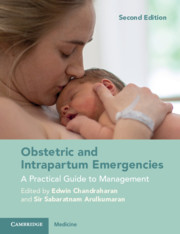Book contents
- Obstetric and Intrapartum Emergencies
- Obstetric and Intrapartum Emergencies
- Copyright page
- Contents
- Contributors
- Preface
- Preface to the First Edition
- Acknowledgements
- Section 1 General Principles
- Section 2 Algorithms for Management of the Top Five ‘Direct Killers’
- Section 3 Intrapartum Emergencies
- Section 4 Postpartum Emergencies
- Section 5 Medical and Surgical Emergencies During Pregnancy
- Section 6 Anaesthetic Emergencies During Pregnancy
- Section 7 Neonatal Emergencies and the Management of Immediate Neonatal Problems
- Section 8 Management of Anticipated and Non-anticipated Emergencies in Pregnancy
- Section 9 Setting-Up Skills and Drills Training in Maternity Services and Reducing Avoidable Harm
- Chapter 41 Addressing Human Factors in Obstetric Emergencies
- Chapter 42 Setting Up and Running Labour Ward Fire Drills
- Chapter 43 Simulation Training for Obstetric Emergencies
- Chapter 44 Learning from Mothers and Babies
- Chapter 45 Risk Management
- Index
- References
Chapter 45 - Risk Management
Emergency Obstetric and Intrapartum Care
from Section 9 - Setting-Up Skills and Drills Training in Maternity Services and Reducing Avoidable Harm
Published online by Cambridge University Press: 06 May 2021
- Obstetric and Intrapartum Emergencies
- Obstetric and Intrapartum Emergencies
- Copyright page
- Contents
- Contributors
- Preface
- Preface to the First Edition
- Acknowledgements
- Section 1 General Principles
- Section 2 Algorithms for Management of the Top Five ‘Direct Killers’
- Section 3 Intrapartum Emergencies
- Section 4 Postpartum Emergencies
- Section 5 Medical and Surgical Emergencies During Pregnancy
- Section 6 Anaesthetic Emergencies During Pregnancy
- Section 7 Neonatal Emergencies and the Management of Immediate Neonatal Problems
- Section 8 Management of Anticipated and Non-anticipated Emergencies in Pregnancy
- Section 9 Setting-Up Skills and Drills Training in Maternity Services and Reducing Avoidable Harm
- Chapter 41 Addressing Human Factors in Obstetric Emergencies
- Chapter 42 Setting Up and Running Labour Ward Fire Drills
- Chapter 43 Simulation Training for Obstetric Emergencies
- Chapter 44 Learning from Mothers and Babies
- Chapter 45 Risk Management
- Index
- References
Summary
Risk management is a systematic approach to reducing the risk of harm to a patient. The concept of patient safety is not new; it has always been the goal of the clinician to achieve the best outcome for their patients. However, the formal process of risk management is a new and rapidly evolving aspect of healthcare. A key publication by the department of Health in the United Kingdom in 2000 highlighted the need to learn from clinical errors [1]. Therefore, recommendations were made for a new system of national reporting and analysis of adverse healthcare events bringing risk management to the fore. With this drive came documents for the royal colleges spelling out the need for robust risk management to ensure high quality care [2, 3].
- Type
- Chapter
- Information
- Obstetric and Intrapartum EmergenciesA Practical Guide to Management, pp. 320 - 326Publisher: Cambridge University PressPrint publication year: 2021



